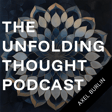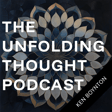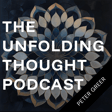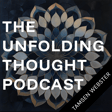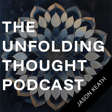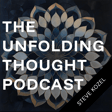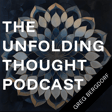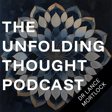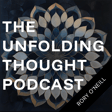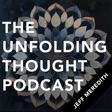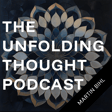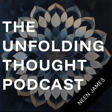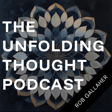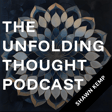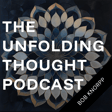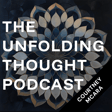Introduction and Guest Background
00:00:03
Speaker
Welcome to the Unfolding Thought Podcast. My name is Eric Bradham. Today, I'm speaking with David Greer, an entrepreneurial coach, facilitator, and author whose journey has included growing a global software company, navigating intense personal and professional transitions, and ultimately dedicating his career to guiding entrepreneurs toward clarity and success.
David Greer's Entrepreneurial Journey
00:00:30
Speaker
David candidly shares experience from his entrepreneurial journey, his path through alcohol addiction, and the transformative impact sobriety has had on both his personal and professional life.
00:00:46
Speaker
We discuss practical strategic planning, the nuances of coaching entrepreneurs through complex organizational challenges, and how to maintain personal resilience amidst professional demands.
Career and Personal Life Transitions
00:01:02
Speaker
This conversation with David inspired me with his authenticity and practical wisdom. And now I bring you David Greer.
00:01:14
Speaker
David, thank you for joining me. Would you mind telling me a little bit about yourself, please? Eric, thank you for having me today. I'm really excited to be with you and the long format of your podcast to let us go a lot deeper into subjects.
00:01:32
Speaker
I am a 40 plus year entrepreneur. I and got my computer science degree at the University of British Columbia in Vancouver, BC, Canada, which is still where I live.
00:01:46
Speaker
And in fourth year, I joined a young software startup as the first employee. um The business has already been going for a couple of years. And I stayed 20 years and built it into a global powerhouse. I'm sure we'll get a chance to talk about some of the stories from that.
00:02:04
Speaker
Um, I am unexpectedly ended up on the street in 2001. Um, my former partner and I only had one major disagreement in 20 years, but it was a doozy and it ended in divorce.
00:02:16
Speaker
He ended up buying me out. Um, and someone smarter than me sat me down and said, David, your kids will never be 11, nine and five again.
00:02:26
Speaker
And you know, I was busy chasing deals in the middle of the dot-com meltdown. and not Not a good time to be trying to find tech businesses to get involved with. And my wife and I decided to do something completely different.
Sobriety and Coaching Transition
00:02:40
Speaker
We commissioned a sailboat in the south of France and we took our three kids and homeschooled them for two years and sailed more than 5,000 miles in the Mediterranean.
00:02:51
Speaker
So I came back, I did three years of angel investing, looking at about 100 deals a year, you know, investing in one, working as a director, working for options. I eventually got very, um I didn't realize, but I was very, very unfulfilled with that work. I just was not talking with people who were like close enough to my level.
00:03:14
Speaker
And I eventually met an amazing coach, Kevin Lawrence, at a training event, which we might explore a little bit later because it's part of my practice now. It was Vern Harnish. He's a guy, his two books, The Rockefeller Habits and Scaling Up.
00:03:30
Speaker
And he has something called The One-Page Strategic Plan. Um, and I went to learn more about that cause I had so many of my tech entrepreneur friends who used it. Um, and I took one of my young CEOs to go learn about it. And I met this coach who specialized in it. And then subsequently I've specialized in it and it's the tool that I use to facilitate with.
00:03:52
Speaker
ah for strategic planning. And anyways, Kevin made me more uncomfortable than I had been in four or five years. I had did tears in the corner of my eyes, standing in front of 100 people in a ballroom.
00:04:05
Speaker
um And eventually I hired him. And, uh, we worked together for nine years in total. Uh, but after 18 months, we had cleared off enough clutter off the table and kind of got my career initial steps to reestablish, uh, that he was the first person i admitted, uh, ever to that. I had a drinking problem.
00:04:31
Speaker
And, um, Kevin, in his personal life, had encountered people with long-term sobriety who were part of 12-step recovery. And he coached me to go to a 12-step meeting.
00:04:43
Speaker
And I did. And I'm now 16 years, ah four months, and six days sober. And yes, I still do it one day at a time.
00:04:57
Speaker
It's the single biggest achievement of my life.
Coaching Philosophy and Recovery
00:04:59
Speaker
And every morning i have to get up and I have to achieve the single biggest achievement of my life. Like that's just, you know, what it means to be an alcoholic.
00:05:09
Speaker
And, uh, Then with Kevin's help, I did a couple senior executive gigs, always working with entrepreneurs who are friends of mine and like working on strategy. There were generally sales and marketing roles. My last role was VP of marketing for a company called WebTech Wireless, who was in the telematics space.
00:05:27
Speaker
They were like at the time, the tenth largest in North America. These are where you take electronic devices and you bolt them to cars or trucks. And then in real time, you can track where they are.
00:05:39
Speaker
And in its simplest form, you know, a fleet manager can see where all of her or his vehicles are on a map. um But there's a lot more sophistication and a lot more reporting and and benefits you can get out of that.
00:05:52
Speaker
And I came out of that gig and I'd worked as hard in my mid-50s in the three years at WebTech as I had probably in my whole career. And I made a decision that I did not want to, I made the decision that I did not have to prove to anyone that I could work hard.
00:06:09
Speaker
Like that, that train has left the station. can, Um, and so I wanted to do something different and I decided, uh, so by this point, I don't know, Kevin and i had worked together probably for seven or eight years.
00:06:23
Speaker
And decided I wanted to give to entrepreneurs the gifts that Kevin had given to me. And so I decided to become an entrepreneurial coach, um, and facilitator. And I took my coach training with the coach training Institute, um, and, um, launched my,
00:06:40
Speaker
ah coaching career. And that was 10 years ago. So I just celebrated 10 years of coaching and I wrote my book, Wind in Your Sales, Vital Strategies That Accelerate Your Entrepreneurial Growth, um that you know collected my, at that point, 30 years of entrepreneurial experience. But I also interviewed over 45 people um entrepreneurs and senior sales leaders and marketing leaders. And 10 of those people are featured as case studies at the end of every chapter. So a third of my book is actually stories from someone else.
00:07:14
Speaker
It's not just my experience, but the these other people's hard-won experience. and And our goal collectively is like, you know, building a business is tough and there's a lot of potholes in the road. And if you wish, you can drive into all of those potholes.
00:07:28
Speaker
Or you can read the book and you can maybe avoid some of them and find some new ones for you to, to go drive into. Um, and it's a very practical book. It's like 10 chapters on but a third of the book is how to think about your business. And then the rest is practical. Like, how do you apply this?
00:07:47
Speaker
Like I end every chapter with take action now. And I have like three steps you could take. you know, based on the subject matter of that chapter to move your business forward, that part of your business for it, whether it's sales, marketing people, um and, uh,
00:08:03
Speaker
Yeah. And so that kind of gets us to today. And then, you know, the, the big thing that happened about four years ago with the help of my new coach knew like seven years ago, Kevin stopped doing one-on-one coaching with entrepreneurs. He, he wanted to focus on groups and facilitation.
00:08:20
Speaker
So he handed me off to his coach, Nan O'Connor, uh, based in Atlanta. And I've been working with Nan for seven years now, almost seven and a half actually. And she just noticed every time I talked about my recovery and my alcoholism and going to Tall Step Recovery, how kind of pure the energy was.
00:08:39
Speaker
And she kind of just kept reflecting this back to me for a couple years until I finally decided that I would become public. about my recovery and, uh, uh, and talk about it. And it's it's on the front homepage of my website. So I specialize, you know, I help any entrepreneurs is really struggling, but I also have a specialty in working with entrepreneurs challenged with alcoholism or addictions.
00:09:05
Speaker
wherever, whether you're still out there drinking or whether you're in recovery.
Personal and Professional Reflections
00:09:08
Speaker
Um, cause even in recovery, a lot of business can be surrounded by alcohol. I mean, a lot of life can, but I think as an entrepreneur, you know, there's even more examples of how that shows up and like, how do you navigate that?
00:09:22
Speaker
So I, I can help entrepreneurs like, How do I close a really complicated big sale and the big last dinner, you know, with the senior executives who are all going to drink too much?
00:09:36
Speaker
Which is, you know, in certain businesses, that's like really common still. I really appreciate that you went through, i don't know if I would call them phases, but as much detail as you did because you gave me a greater appreciation for who you are at this point.
00:10:00
Speaker
than often get. You know, you you could just describe what you do today, or you could start when you were three years old, perhaps, and there are positives and negatives of, you know, many different approaches, but you provided enough detail that like i said, I have a greater appreciation. And for what it's worth, you know, I mentioned before we started recording that we are from, uh, from more or less the same region of the world. I grew up near where you live and all of that. And so, so there was that, but then i don't think I had realized this. So, um,
00:10:45
Speaker
I worked for a portion of my career with angel investors and was reviewing pitches, you know sometimes 80 pitches a month in some cases, and deciding what got through the screening process in order to to actually get pitched.
00:11:04
Speaker
And then I worked in nonprofit for... ah exclusively nonprofit for about 10 years of my career. And a lot of the focus of my time was with organizations that work broadly in the categories that are often overlapping of poverty, addiction, homelessness, you know, and all of the often related issues.
00:11:32
Speaker
And I would add trauma. Yes, exactly. Yes. You know, Gabor Matate says that, you know, like... you Every homeless person on the downtown Eastside in Vancouver, if you dig into that person, there is a story of trauma.
00:11:45
Speaker
I think that's you know something that when it when it's over there, when it's the other, it's also hard to appreciate. I said this in an episode with a gentleman, Andy Bales, who I spoke with, who used to run the largest rescue mission in the world in l LA on Skid Row and that, you know, people often don't realize that somebody who's homeless on the street typically had very, what I'm going to call common events happen to them.
00:12:16
Speaker
They're just unfortunately tragic events, you know, where they were dealing with trauma from their childhood or a marriage or whatever. And then they lost their job, which put stress on their marriage.
00:12:27
Speaker
And then, you know, and it's things that it's like, well, that happened to me too, or it could have happened to me easily. That's what people forget is, you know, you might only be one paycheck away from being that person, that homeless person, you know, on the wrong side of town.
Book Insights and Alcohol's Impact
00:12:43
Speaker
I am glad you mentioned your book because i have said this plenty of times. So for anyone listening to this, it will likely not be a surprise, but I read a ton of books last year. I think it was 189 on I'm going slower at the moment. So I'm probably at maybe 65 or 70 for the year so far, but I am halfway through your book at the moment.
00:13:09
Speaker
And i I honestly, I just didn't manage my schedule very well. Otherwise i would have been done with it, but yeah, it's a very tight book. And I like how you weave the, I don't know if I would call it stories or the, you know, little, uh, instances of when you were sailing into, I think it's in each chapter.
00:13:35
Speaker
Each, each chapter starts with the sailing story. which which i try and make a make it be a metaphor for what i'm what i'm going to talk about in the chapter when did you publish your book uh i just celebrated the 10th anniversary okay and i i really wrote it very carefully to be like an evergreen book um like five years ago i did the audio version and i found two instances of stuff that i felt was like um dated
00:14:08
Speaker
like two paragraphs out of the whole book. So I thought pretty good job. Um, and I'll tell your listeners, the, you know, the book is really targeted at owner founders who are still with the first business that they founded.
00:14:23
Speaker
So, you you know, if you've done multiple businesses, um, you know, or you've been an angel investor, like the book will probably be a little too simple for you. Um, but again, I target, that's the particular person, you know, it's like when we started Robel, we just grew it by the seat of our pants.
00:14:43
Speaker
And we did read some pretty important books that helped us, but we didn't have a wind and nurse in your sails to help us. Like when we were growing Robel. And so it was like when, you know, where Bob and I were in the first five or 10 years of the business, that's what it's intended for.
00:15:03
Speaker
um Cause you're right. It's not like ah you can't, you know, it's, uh, every chapter in that book could be a book in itself. Yes.
00:15:14
Speaker
Easily. Right. Um, so it's like enough to dip into and enough to get you going and moving in the right direction. And then where appropriate, you'll find other resources. so So one thing you talked about a little bit in your story, which I feel like might also be sort of our path into talking about your philosophy and the work that you're doing today, talking about that in more depth, is...
00:15:47
Speaker
alcoholism. um And so I'm wondering if both in your experience and then also in what you experience with your clients or other entrepreneurs generally, did alcohol play a, an increasing role in your life or your experience, you know, drinking more over time?
00:16:12
Speaker
Was there a turning point where it, you know, went from, i don't know, some, some moderate amount to an increasing amount? How, what was your experience? And then how does that relate to generally what you see from other entrepreneurs?
00:16:29
Speaker
My experience with alcohol, so I, you know, I drank, well, I drank because I'm an alcoholic. That's, that's the most simplest reason of why I drank. But, you know, I drank to power up. It was rocket fuel.
00:16:41
Speaker
You know, I drank to make the lows higher, drank to make the highs higher. um So, you know, that first business, Robel, like, you know, I was a drinker all through that. Was I...
00:16:52
Speaker
Was I an alcoholic? Probably not early on. You know, one of the things is, you know, like when did I become a pickle that couldn't go back to being a cucumber? I don't know.
00:17:04
Speaker
i do not know, like, because for me, for many people, alcohol ah alcohol is an alcoholism, alcohol use disorder, um is a progressive disease. So it's very much for progresses over time.
00:17:19
Speaker
And so a lot of us can't, like there's not a, for some people, it's like I picked up the first drink and it was like, i went blackout drunk and I, you know, I did that until I came into recovery.
Alcohol Use Disorder and Recovery
00:17:29
Speaker
That's not my story, right? My story was I still could operate and, you know, I could drink a lot of alcohol and still, you know, walk without stumbling and not slur my words, um you know, which is probably more typical than not. Like high-performing alcoholics um are the norm.
00:17:48
Speaker
Like they're your friends, they're your neighbors, they're your coworkers. Like one in 10 people have alcohol use disorder. So you think of 100 people you know, think of 10 people you know, there's a moderate chance one of them has AUD.
00:18:04
Speaker
and What I do know is when I came into recovery, when I look back, when my wife got pregnant with our first child, i she said she was going to stop drinking when she was pregnant.
00:18:17
Speaker
And I agreed to support her by not drinking. That lasted 24 hours. And still don't know to this day how I squared it with my wife, but somehow I did.
00:18:31
Speaker
And I continued drinking. So I can say definitively, when my wife got pregnant with our first child, I was, I was pickled. I'm sure I was pickled before then. i just can't tell you.
00:18:45
Speaker
exactly when. And, you know, for me, I still was coping with life on a reasonable basis and nothing really bad happened.
00:18:57
Speaker
Um, and, um, you know, um, and I, you know, partly that kept me in denial and it just got to a stage where I got sick and tired of being sick and tired.
00:19:14
Speaker
and And again, the progressive nature of the disease, which actually is some part of the neurochemistry of our brain. So when we put alcohol in, alcohol doesn't target a particular part of our brain. It kind of goes after the whole thing.
00:19:28
Speaker
um And our brain starts issuing um countering chemicals to counter for the alcohol. And then as we drink more, our brain gets better at faster and issuing more of that.
00:19:42
Speaker
That's part of why it's progressive is that our brain wants homeostasis. And obviously you're not a homeostasis when you're putting a bunch of alcohol in you and into your brain.
00:19:54
Speaker
um But your brain is doing its best job to put you back into homeostasis. So, you know, when I was in my thirties, I probably six drinks was enough. and you know, at the end it was probably 15.
00:20:09
Speaker
you know, and I probably drank 12 or 15 drinks a day towards the end. And again, i still could operate in the world. um But I just got really tired of like just being beholden to the alcohol and...
00:20:25
Speaker
Just, yeah you know, and and I, I was in denial for soloing. So I do things like on Monday, I would go to the closest liquor store and get some alcohol. Well, when you drink as much as I do, like you have to go to the liquor store multiple times a week and you better get the empties out of the house.
00:20:41
Speaker
Both of those are quite challenging. Like if you're hiding it like I did. um So like on Wednesday, I go to a different liquor store because if i went to the same one I went to on Monday, well, you might think that I had like a drinking problem.
00:20:52
Speaker
So like my brain is rationalizing these things that are clearly demonstrating I do have a drinking problem. Right? And Friday I go to a different liquor store again. And then you repeat this week after week after week.
00:21:06
Speaker
It's just, it's the craziness of having an alcoholic brain and being in your alcoholism. Right. And I noticed someone who isn't, you know, an alcoholic, this probably sounds a little crazy and that's, well, we have a mental health disorder. Alcohol use disorder is formally, you know, ah a mental health disease.
00:21:25
Speaker
And, um, you know, when I went into recovery, I had a house and I had three kids and I had a spouse and a couple of cars in the driveway And here, you know, 16 plus years on, I've got a house and I've got three kids and a spouse and two cars. And now I have two grandkids.
00:21:44
Speaker
What's different is the person inside, the part you don't see, is completely different than that individual who walked into his first meeting on January 27th, 2009.
00:21:57
Speaker
And it's that internal work that is what has really made me into a different human being. So from the outside, you might say, Hey, David, it doesn't really look any different and you'd mostly be right.
Stress Management and Recovery
00:22:13
Speaker
And, but that's not the point, right? The point is that I, i had gave up on myself. I'd gave up, right. The alcohol had taken over and, um,
00:22:26
Speaker
One of the things I did was when I went into recovery, I committed that I would focus, I would every year do something for my personal growth. And I have done that. So, you know, I've worked the steps to eight the in my alcoholism program, ah like at least eight times. And I'm also a member of adult children of alcoholics and dysfunctional families. And I've worked all three workbooks in that program, which have also been incredibly life-changing, um,
00:22:51
Speaker
So um I've continued that growth path that, you know, I ah in many ways ignored for 20 years while I was a daily drinker. I believe that...
00:23:04
Speaker
You know, there wasn't a lot that you said necessarily in sort of telling your story at the beginning of our conversation, but it was alluded to. And then, but I think I came across it in your book that, you know, you, you built a decent sized business.
00:23:21
Speaker
You were one of two founders. Well, I was hired as the first employee and then I bought out one of the founders. So you're fairly central to the business. Nonetheless, you had a lot of responsibility. You were tied up and in that.
00:23:34
Speaker
And so you, of, was any of you know, your alcohol use related to dealing with things like burnout? Because a lot of entrepreneurs can burn out even from businesses that they love or they love the job, but they're working too much or there's too much stress or there's too much any number of things.
00:24:04
Speaker
And alcohol and other things can become ah form of compensation for you. Was it like that? You know, I don't think consciously, but I mean, you know, the reason i drink is to cover up some feelings that I'm uncomfortable feeling.
00:24:21
Speaker
So whether that's I'm working too hard, whether it's I'm scared about the business, like, and like that's, you know, Alcohol is my cure for what ails me in life.
00:24:35
Speaker
So you think about an iceberg that, you know, the analogy 20% is above the surface and 80% is below. Well, the drinking part is the 20% above the surface.
00:24:47
Speaker
And it's trying to deal with the 80% that's down below. And when you give up alcohol, you still have the 80% down below, but now you have to cope. Like you have to cope with life on life's terms without your tool of choice, which is alcohol.
00:25:01
Speaker
So yes, my, you know, alcohol is how I dealt with everything because I drank every day. Right. And, you know, a certain amount of that was just not to feel whatever it was that I was feeling.
00:25:16
Speaker
And then it was, I've got sober. I've had to go explore that more.
Strategic Planning in Business and Recovery
00:25:20
Speaker
and And also dig deeper into, like, it turns out, I shared earlier in our conversation how I decided after working harder than I ever had in my career at WebTech Wireless that I'd do this coaching gig so I wouldn't work as hard.
00:25:35
Speaker
Well, it turns out for me, not working hard is really, really hard work. Like, I am super, super hardwired to work hard. And it's it's a very ongoing still 10 years in, 16 years, 10 years of being coached, 16 years of sobriety.
00:25:55
Speaker
And my cast master spirit still shows up in new and interesting ways that I've never noticed before. They were always there. This is now i'm better able to see it. um It's what produces this kind of very driven activity. And I've done enough personal work. I know where comes from.
00:26:11
Speaker
i know why it showed up. but it's so deeply, deeply entrenched in me that it just, it shows up in, like it just comes out.
00:26:21
Speaker
and And for me, I visualize it as like an octopus. Like if you got eight arms, you can really get me to do a lot of stuff. But you also be really sneaky because I'm like paying attention to how you're trying to make me do stuff over here. And then you actually have me out going for a walk down to Starbucks that I hadn't even realized that's what I was going to do.
00:26:39
Speaker
In your book, I feel like I don't recall if you state this or not, but it came across pretty clearly to me that you are fairly committed to, or you have a philosophy that planning is very important, strategic planning, for example, but also just being explicit about, I forget some of the chapters, so forgive me if this is not exactly, you know, one chapter or another, but
00:27:12
Speaker
some of it comes across to me like, well, if you have an ideal customer, if you have a goal, if you have things that you need to accomplish this year, let's do some planning and write them down.
00:27:28
Speaker
And then we'll know what we need to do and we can refer to them and so on. And i I'm wondering if, you know, maybe there's some personality or behavioral traits that,
00:27:44
Speaker
predispose you to things like that. But also, i i also wonder if there are some similarities, perhaps, between things like the clarity of a 12-step program, you know?
00:27:59
Speaker
How do you deal with addiction? Here it is. These are the steps is you follow these. And I forget what one program or another says, but there's some phrase like um work the plan or something of that nature.
00:28:16
Speaker
And, um, and I feel like there are some similarities between the clarity that a 12 step sort of program provides and the clarity that I think in your book, you're trying to get your audience or perhaps even your coaching clients to develop for themselves.
00:28:36
Speaker
You have goals. Let's follow a plan so that we can become, or we can be who we want to be. My biggest request to my clients as a coach is conscious intention.
00:28:49
Speaker
Like if you consciously want to go without a plan, actually have a client who's like being super high performing. He just exited one business and he wants a six month period without a plan.
00:29:01
Speaker
And like, I'm really supportive. Like, I mean, within some certain caveats around financial things and a couple of things, but, um, it's, it's not like you have to have a plan, but again, are you doing it just because like without any conscious intention and without any knowledge, um, and you consciously doing it, you know, knowing the consequences of not having a plan.
00:29:28
Speaker
Or are you just letting life happen to you? And so you're right in tall step recovery, we have these steps. Um, they're our solution to life.
00:29:39
Speaker
Like I said, we take away the alcohol. That's was our solution. So we need, we don't need a solution so much to our not drinking. We need a solution to how do we cope with life without the thing that we always used to cope before.
00:29:53
Speaker
And what we have is the 12 steps. And in recovery, we say 12 steps are easy. The work is really hard. they're They're not that hard to understand, but to be motivated enough to do the kind of work that those 12 steps ask of you, um that is actually quite challenging personal work in my experience.
00:30:15
Speaker
Now let's go back to Robel. So we built a business for 20 years. Did we have really clear cut goals you Sometimes, sometimes not. And, you know, what we did was, I think, very classic entrepreneurial was kind of, why don't we, you know, we'll do 5% better this year than we did last year.
00:30:37
Speaker
But then, you know, like, that's kind of a wish, because we wouldn't sit down and like work out like a plan for how would you get there. Like in one year, i remember, I might talk about this in the book, we had about an 18% increase in revenue.
00:30:53
Speaker
And we were really congratulating ourselves. but Man, are we hot stuff. And then eventually, by the time we got the year in financial statements and we met with the accountants and we worked it all out, um about 15% of that growth, so we're a Canadian software company whose principal market was the United States.
00:31:13
Speaker
And 15% of that growth that year came from the Canadian dollar sinking against the American dollar because we priced in U.S. dollars. So this thing we were like busy, you know, testing ourselves off and saying how great entrepreneurs we are had nothing to do with us.
00:31:30
Speaker
They were, it was something completely outside of our control in which we probably couldn't have planned for. and and you know, that's, I think the risk you take by not having better knowledge of your business and what's going on in your business.
00:31:44
Speaker
And if you don't create plans and try execute it the plans, then you generally don't know your business as well as you could. And like a lot of the work I do with, with entrepreneurs now, um, who I work with is just literally like helping them to understand their business at a much deeper level.
00:32:02
Speaker
Again, you know, people who've started their business, grown it done very well, but you know, several years ago, they were a million dollar a year business. Now they're 8 million a year and little tiny permutations in that can have much bigger consequences.
00:32:20
Speaker
Right. So, um, and there's a lot more moving parts, a lot more people. Um, so, you know, sometimes it's like, are you really making money?
00:32:31
Speaker
Cause more entrepreneurs focus on top line revenue. I'm like, well, that's great, but how much money are you making? Cause I don't think businesses should be charities. I think they're, they're here Ultimately, they should make you money. Now they should make you money by finding a market with a really deep pain and with a solution that is a great pain pill to solve that pain.
00:32:53
Speaker
And so that creates a lot of value. And from that, you will make a lot of money. But at the end of the day, are you doing the, are, you know, is there pain? Are you creating value? The way you know is at the end of the year, did you make a bunch of money?
Coaching and Accountability
00:33:06
Speaker
Like that's the acid test. It sounds to me like you probably deal with quite a few clients that maybe at the time that they come to you, they feel like they haven't created a business as much as they've created just another job for themselves.
00:33:29
Speaker
Generally, people only come to me because they're stuck on something. Right? Like, if everything's smooth running, why do I need a coach? Right. So, um, you know, it, it can be everything from like some owner founders, the part that really gives them joy is that early stage and figuring it out and, you know building the business and building the initial processes. and And now it's like a 5 million a year business.
00:33:57
Speaker
And they're spending all of their time fighting fires and operating the company. And like, they're not doing anything to like find a new market and a new product. And like one of the, sometimes just the first question I asked, um, you know, new clients is why did you start your business?
00:34:14
Speaker
And like, what was fun about, you know, starting your business? Yeah. Then they'll go da-da-da-da-da-da-da-da-da, and I'll say, great. And so how much of your week, for the in the next week, how much of your time will be spent on the da-da-da-da-da you just told me?
00:34:28
Speaker
And often it's like zero, right? And so that's what of you know what you kind of alluded to. That's where you reach that. It's not fun anymore. Well, it's because that you were hugely successful, but the fun part of the business is not the part you're there's not the stage you're in right now.
00:34:45
Speaker
So, but rather than kill the business and like blow it up so you have something to fix, which is what someone like me would do, because I'm more of that. I love the figuring out the process, documenting it, getting people to use it.
00:35:01
Speaker
And then as soon as I have to do it more than five times, get me out of there because I'm like bored. Right. Um, so that's also partly like my coaching strategy is I always get people to take the strength finders.
00:35:15
Speaker
Strength finders is like a book, uh, that you can buy in, in it is a coupon. You go do an online assessment and the book talks about, I think 42, 43 strengths, but out of the assessment comes five.
00:35:29
Speaker
And, you know, my coaching and life philosophy is that we should operate in our strengths and then we should backfill ah with processes, money, time, people, those things that we're weak at, you know, to the extent that we can.
00:35:43
Speaker
and I think it's way more important to take a strength from 95% 95.5% than take weakness from 10% to 20%. I mean, probably more to take the weakness from 10% 20% and you won't have moved the needle at all. it's probably more work to take the weakness from ten percent to twenty percent and you want have move the needle So this is part of the, you know, and the other thing is then entrepreneurs will hit a ceiling where they've grown their business certain level and then they can't get it to the next level.
00:36:08
Speaker
And typically that's because like they need to make a change in themselves because what got them to where they are will not get them to where they want to go. And so they need my help to reflect back on with them and help them figure that out.
00:36:25
Speaker
Do you have a large portion, let's say, of the clients that you work with that come to you in part because they don't have advisors or impartial parties to to talk to You know, it's often sort of like lonely at the top.
00:36:45
Speaker
and Definitely that. And ah also, i I encourage people, if you can't afford a coach, is to go find so like a peer group. But I find peer groups, peer groups help and it helps to talk to our entrepreneurs and their problems, but you don't get the accountability piece and the kind of one-to-one, know, you meet once a month, you know, you get some ideas, um, you know, they may or may not be using kind of the best tools.
00:37:14
Speaker
Whereas, you know, as a professional coach and a very successful entrepreneur, I built a really big toolkit. Um, it's also, I say like, again, if you're not going to get a coach, at least get a mentor.
00:37:25
Speaker
But what I found in mentoring other entrepreneurs is that it's just the accountability piece. They're not as willing to be accountable to a mentor. Whereas when you pay someone every month,
00:37:39
Speaker
So, you know, I charge a fair coin, but it's it's reasonable. And to some of my clients, like my fee, it's not even measurable as rounding error. But because they pay me, they show up for every call.
00:37:52
Speaker
Like, it's just funny how how that works. They pay me, so they show up for every call. And for the most part, they do the work between the calls. Somewhere i came upon with you that you recommend breaking down your strategic planning or maybe even your measurement of your progress into sort of like quarterly planning.
00:38:16
Speaker
And Yes, yes and no. um So again, back to Robel, very successful company, did it kind of the classic, we'll do a little bit better than the last year. um The problem with that approach is, let's say you're in a market that is growing at 10% a year.
00:38:38
Speaker
And you don't like stand back and really look at that bigger picture and you're not growing in 10% a year, then you're losing market share. And you might not even be aware of it. So the thing, when I went to this Vern Harnish event that I mentioned early in our conversation, so in his two books, Scaling Up and The Rockefeller Habits, what blew my mind away was his process is you start by picking a future date that's three to five years in the future.
00:39:07
Speaker
Where are you going to be on that date? Like how much revenue, what markets are you going to serve? Like maybe today you only serve Canada, maybe by then you'll also serve the United States.
00:39:20
Speaker
Like, again, it's unique to each company, but it's, it's some market ideas. So what, what are the markets you're going to serve? Is it the same market you have now or a different or adjacent one? Is it the same product lines? Yeah.
00:39:34
Speaker
And have that discussion, like, what is it going to look like? So you know where you're aiming for in three to five years. And you identify maybe three to five key capabilities or key hires that you need to happen in that timeframe.
00:39:51
Speaker
Like if you don't sell into the United States today, you're a Canadian company because I'm here in Canada. um Then a key capability is you need to build the capability to sell into the U.S. Which it might be easy to build that capability or you might need a distribution center.
00:40:08
Speaker
you You might need a manufacturing facility. like um So that would be like on the list. Like... Of the key capability we need to build is by the end of three years from now, we need to have a manufacturing facility established in the United States or the Western U S or whatever you work out.
00:40:25
Speaker
Once you're clear on where you want to go in that longer timeframe, Then you work out where do we need to go this year so that we can get to where we want to go and three or five years.
00:40:37
Speaker
So it's this, like, I think Robel, we would have done even better than we did if we had used this kind of process where we looked farther out. um And then once you are clear in where you want to go for the year, then decide on where, what you're going to achieve this quarter.
00:40:58
Speaker
And again, for the year, i I restrict it to a maximum of five goals. Um, that's part of the one page strategic plan. Um, and for quarter, like quarterly corporate goal for, to achieve no more than five.
00:41:13
Speaker
And sometimes with my, with teams, I'll actually ask them and they'll look at how much stuff is on their plate and they'll say, no, you need to restrict us to four. which can be really hard in a planning session, like, you know, um, to eliminate that one. But, um, that often is the, you know, that's the difference between getting four done and having five and not getting like three done because you pick too many goals.
00:41:37
Speaker
And then part of my work as a facilitator is I help people really get clear on what those goals should be and that they have clear finish lines. Like I tell people, we need to meet three months from now. We need to be unequivocal. You achieved it or you did not.
00:41:51
Speaker
So improving customer service, that's an aspirational goal. Have no idea, but is is a terrible goal to put down for your quarter because I'll say, well, how do you measure customer satisfaction now?
00:42:05
Speaker
Oh, well, we don't. Okay, well, maybe for this quarter, a reasonable goal would be to have a system in place and to have at least one survey completed from a customer on the customer satisfaction.
00:42:17
Speaker
And then maybe next quarter, we'd set a goal to monitor that for for for a quarter. And then in the next quarter, we could actually set a goal for how we want to move that. um So, and no, why quarters?
00:42:31
Speaker
Quarter 13 weeks. Okay. And my argument is in 13 weeks, you can get a lot of shit done. But if you completely go off in the wrong direction, you can course correct without killing the company.
Long-term Vision and Goals
00:42:44
Speaker
It's very hard in 13 weeks to go so bad that you literally have risked the whole company. mean, I can come up with certain scenarios that'd be true, but it's, it's a lot harder.
00:42:57
Speaker
Um, and this whole thing about the Rockefeller habits and this one page plan, it's about a meeting rhythm. for planning where you meet every quarter to plan the quarter. And then once a week, like you meet offsite and you take twice as much time and you relook at your three to five year goals, like maybe they need to be modified.
00:43:18
Speaker
Then you come up with new one year goals for the new year. And then you come up with what your first quarter goals are. And so you just, you keep repeating this process Quarterly tends to be very tactical, you know, very, what's the next thing we need to do to achieve the year's goal.
00:43:33
Speaker
And we, I mean, I bring up the three-year goals and just like, you know, no new brutal fact has shown up that would like completely invalidate this. Now here's what's interesting. So we look at COVID and the pandemic for all my facilitation clients, not one of them changed any of their three to five-year goals.
00:43:54
Speaker
They changed their one year goal and the quarterly plan got completely blown up and completely changed. Uh, but I found it very interesting, like the longterm where they're aiming, what they're trying to achieve, where they want to go.
00:44:08
Speaker
That didn't change. Even though no one, no one knew how long the pandemic was going to last. Like, I'm talking in the middle of the pandemic. No one knows when it's going to be over. No one even really knows what its impact is going to be.
00:44:20
Speaker
um But this, this is still where we want to move to business, even with having to deal with this new brutal fact. It sounds to me like part of the reason for that is that you and I might describe this a little differently. We might put a different label on it, but part of what I think we're still ultimately going for when we talk to some clients is I will put things in terms of more or less, what's your vision?
00:44:50
Speaker
You know, 10 years, 25 years, 100 years from now, what's the world like or how are things different or whatever, if you fulfilled upon your mission, vision, values, sort of thing.
00:45:04
Speaker
And And we can go back further. We can come closer to home and less is going to change, right? In three years versus 10 years, whether it's in your business or it's in the world potentially. But the closer that we come to today, the more confidence that we can have about how things are going to be or go by that time.
00:45:29
Speaker
And yet still, i suspect that a contributing factor to your facilitation clients, not changing their three to five year goals, I think was the, the word there or their or plan or whatever.
00:45:45
Speaker
Yeah. Keep key capabilities. And it was more like a vision, you know, that, Well, we might get there via a different path now, but whether it's five years or it's five years and six months, we are still committed to hitting that finish line pretty much right on time.
00:46:04
Speaker
Yeah. And I'm skipping over some parts of the plan. So, you know, the plan actually starts with your core values and articulating your core values and what they are.
00:46:15
Speaker
And then the next piece of the plan is, you know, in Jim Collins, good to great. Like, what is that 30 year purpose? Like, why are you here? Why do employees get out of bed in the morning?
00:46:28
Speaker
Like, So it can be like a more specific goal, but it's, it also can be more something that is like driving change in the world or change in markets.
00:46:39
Speaker
And then, um, also as like that part of the one page plan would be again, a Jim Collins concept, which he actually is copyrighted or trademarked, which is the big hairy audacious goal.
00:46:52
Speaker
Like, so, so, and that's much more a measurable piece, right? Like, You know, 30 years from now, how will you know you made the change that you did? Like, what is your big, hairy, audacious goal to have achieved that?
00:47:07
Speaker
um So that actually comes in front of figuring out where you want to go to three to five years. So again, like it, it's all the same process. It's really that long-term visioning, that long-term purpose. Why are we here?
00:47:21
Speaker
Um, and then, you know, the five years making it much more concrete, the one year, extremely concrete. And then the quarter, this is what we're absolutely going to get done this quarter.
00:47:33
Speaker
And the big thing is a lot of like at Robel, we didn't write most of this down. Like some of what really changes is when you actually just write it down and get it on a piece of paper.
00:47:48
Speaker
Right. Um, because that ends up holding people accountable. but Like one of my very first facilitation clients, three partners, they brought me in We did our first plan.
00:48:01
Speaker
Two of the partners suspected that the third really didn't like do what he said that he was going to do. And we had like written down quarterly goals. We had, it was accountable for each goal and two months in,
00:48:14
Speaker
One of the partners was wildly off in a completely different direction, was doing absolutely nothing to achieve the goal that he had agreed to. It just made crystal, crystal, crystal clear to the other two partners that their third partner was never going to be accountable.
00:48:30
Speaker
And so they broke up. So they split the firm in two, and the two partners went off um with... one One and some of the clients and the other person went off with theirs.
00:48:43
Speaker
And, um, and the person that went away, I never ended up working with again, but the two that decided to stick with a plan and to extricate themselves from one of the partners, they have now been a nine year client and, and have done amazing. Like when I look where they were nine years ago and what they've achieved today is like in their private equity firm and in terms of assets under management, like it's,
00:49:09
Speaker
It's really, really remarkable. They built something very special, um you know, but we did it in this process and kept moving the goalposts as appropriate. If an entrepreneur is listening to this and you know you were to say, hey, if you do nothing else, you start here.
00:49:32
Speaker
You start with these three things sort of thing. you know you You said one of the questions, if not the first question that you ask people often is, why did you start your business?
00:49:43
Speaker
And then you know in your book, you have some things that people should do. but and you've talked about some of them here, but as a starting point, sort of whether it's just an entrepreneur, they have no specific pain points, you know, right now, or they are drowning or they're burnt out or what, regardless of where they're at right now.
00:50:11
Speaker
If you were to say, Hey, if you do nothing else, do this one, two, three, however many things, what, where would you tell them that they should start? Um, write down something that you want to achieve for the next quarter.
00:50:24
Speaker
So here's the deal. Like if we actually write on a piece of paper, what our goals are, we are 50% more likely to achieve them. Even if we never take the piece of paper and look at it again, if you want to up that, you know, bring the piece of paper out once a month and see how how you're progressing.
00:50:39
Speaker
If you want to up the probability again, like show the piece of paper to someone else who you will be accountable with. Um, It's, it's literally that simple and that hard.
00:50:54
Speaker
Like, like it's, it's like a lot of these tools. They're, they're just, they're not all that complicated, but you got to use them. Like that's the challenge and people get busy and, you know, and you know, it's part of my role as a coach. It's like, Hey, we're starting to do a new quarter. Have you met with your team? You decided what you're going to do this quarter.
00:51:15
Speaker
Oh yeah. Oh, we haven't done that. Well, when are you going to do it? Yeah, when when someone comes to you then and they're a client, what are the biggest struggles that then stop them from making quarterly plans or coming up with goals or whatever else? Because I think they've taken a big step by making a commitment. They're not paying. They're going to and outside advisor.
00:51:47
Speaker
And yet they're still... hurdles There are competing priorities, time, money, natural behavior. So what do your clients still tend to struggle with, even as you're trying to coach them?
00:52:03
Speaker
So some it's like this level of detail and process is too complicated for stage status of the business. So maybe you dial it back to twice a year instead of every quarter.
00:52:15
Speaker
Um, that, that can be an issue. and sometimes to remember as a coach, like i mostly show up with questions. I try not to show up.
00:52:27
Speaker
I mean, I share my experience, strength and hope in business and in recovery. Um, so like I said, you don't have to drive in all the potholes, but at the end of the day, it's your life and it's your business. So it's like, okay, you don't have to have a plan.
00:52:40
Speaker
And you know, here's the likely consequences of not having a plan, given what you've told me and where you want to go. Like, what do you want to do? You know, coach Kevin, when I first hired him, he was really good. I remember our conversation in the back of the room at the Vern Arnish events where he made me super uncomfortable.
00:52:56
Speaker
He said, look, David, I'm going to be there for you. And, you know, I am going to point out sometimes, you know, ah pretty rocky road you might be going down based on my experience.
00:53:09
Speaker
And at the end of the day, It's completely your choice. Like you can go left or go right. All right. I just point out, you know, from my experience, what left and might happen down the left or the right.
00:53:23
Speaker
And if you choose the left road, which was the really bumpy one and you crash and burn, I'll be there to pick up the pieces with you.
Owner-Founders and Organizational Challenges
00:53:30
Speaker
Because that's what being a coach means. It means i don't I'm not going to judge you for that choice.
00:53:35
Speaker
I'm not going to say I told you so. um I'm just going to be there. Okay, here we are. You made that choice. Here's where we are. um Where do we go from here?
00:53:47
Speaker
What do you want to do? I mean, part of my coaching agreement with the very last paragraph they need to agree to is it's your business. It's your life. You know, this contract is intended to get you what you want.
00:54:02
Speaker
Right. And, and at the end of the day, that's, that's mostly up to you. You said, I believe that your book is more targeted towards founders that are still with their first business. I think it was.
00:54:21
Speaker
And do you have a similar sort of focus, even if the, the, the, the bounds of it might be different or the characterization for your coaching?
00:54:32
Speaker
You know, do you specialize in certain types of situations or industries or certain types of people? Not yet ah people. So I look for entrepreneurs, principally owner founders who've grown their business to like at least a million a year, um have at least 10 to 250 employees.
00:54:53
Speaker
Like a lot of what I bring to pay to, to the table, I think are the people culture, um performance of people. um I do a lot of coaching around having difficult conversations, um,
00:55:06
Speaker
You know, which, so I don't, I didn't know if I have any, I've only had one or two like solopreneurs. Cause I think the value I bring is much more to entrepreneurs who've got teams, people, and you know, today we've talked a lot ah about the entrepreneur herself or himself and kind of issues that come up for them.
Self-Care and Work-Life Balance
00:55:27
Speaker
we haven't talked so much about the organizational issues that come up.
00:55:30
Speaker
Um, but, uh, that's where I often do a lot of work and a lot of help, um, is around those, those kinds of issues. Um, so, uh, and, and yeah. And also for me, like you need to be a pretty much high energy, high performing kind of individual.
00:55:54
Speaker
I mean, I can coach people who don't fit that mold, but I can't be my most natural self. And people who are struggling and are beat down, like I can lower my energy and I can meet them where they're at, but it's just, that's not every call.
00:56:11
Speaker
Right? So I'm more high energy people who want to torque with me and I want to torque with them to go achieve great things. Right? Um,
00:56:23
Speaker
in In business and in life, right? Like, so, I mean, ever I only get hired because of the business side, but inevitably, you know, some aspect of the life or the self part shows up.
00:56:36
Speaker
Like the the one thing I don't talk about much in the book, but my former coach, Kevin Lawrence, talks about in his book, um which is your oxygen mask first, which is really think about your life in three core areas, which is your, like,
00:56:51
Speaker
career business finances. Like we think of that as a bundle, then your life relationships. So your significant other, your children, your close friends.
00:57:03
Speaker
And what, what counted I find with high performing people is that we're super, super passionate. And so we're usually super passionate about the business, super passionate about our life and these relationships.
00:57:15
Speaker
And where we fall down as we squeeze ourselves out in the middle. So the third bucket is self. So what do you do that is purely for you?
00:57:27
Speaker
Does that jump out of an airplane for me? It's go sailing. Um, you know, and what do you do to build your own resiliency? Um, so like, you know, I have a pretty good developed habit around exercising.
00:57:40
Speaker
You know, I was at F45 fitness at 730 this morning, did a workout, you know, that's part of that self and making sure i'm looking after myself and Because if I don't look, and you know, I go to 12 step meetings three times a week, because make sure I don't want to, because if I pick up a drink, then i I will not be there for any other aspect of my life.
00:58:01
Speaker
So that's part of looking after self. And a lot of people, especially high performing people tend to think this is selfish. And I'm like, you can be self less, but if you go to the extreme of, if you think of a pendulum swinging back and forth, if you go to the extreme of selfless, you will completely burn out.
00:58:22
Speaker
If you go to the extreme of a hundred percent selfish, you'll have no friends. Right. So, and, and it's, it's a pendulum. So swings back and forth. And it's, it's sometimes you, if you've gone through a very intense period, you often have to, again, this conscious choice, you need to consciously check out and do things that other people may say, Hey, you're being really selfish.
00:58:44
Speaker
And I might say to them, yeah, I am. And this is what I need right now. So in, in planning and goal setting, I really encourage people to look at each of those areas. I had some folks tell me not long ago that, you know, like a lot of people with young children in particular, that they just don't find the time to exercise. And it was interesting because the this was all men.
00:59:13
Speaker
and And I say that because it would be easy, I think, to stereotype depending on who you think is saying this. and But And the dominant sentiment, I guess, in the group or statement was that they knew that they needed to do some form of exercise, but that they felt guilty, like they were taking something away from their children or their families.
00:59:38
Speaker
And I'm not saying that they're wrong, but what I would say is I would perhaps start by describing exercising for yourself or taking five minutes when you need it to just have some time of peace or having your coffee in the morning or whatever it is that you do for you.
01:00:05
Speaker
And you probably need to do things for you in multiple areas, but let's just make it really simple. Say it's exercise. I would probably start by saying it's a part of a whole and you are a part of a whole and that You know, you have to make some minimum investment in yourself if being physically fit wakes you up more, if it makes you more alert, if it makes you feel more positive, like makes you live longer, whatever it is.
01:00:42
Speaker
And not doing those things also has positive and negative impacts. It's all a part of the greater experience for your children or your business or your experience in life.
01:00:54
Speaker
And it honestly just this is not so much my philosophy or how i would advocate. This was my experience in the moment. It just felt so weird to me to hear this, frankly, because and this is probably more about personality traits and all that, but I was like, I don't understand feeling like I'm being selfish because yeah, of course I'm selfish. Sometimes there are plenty of times when I do things and I will rationalize it as, well, this is for the greater good sort of thing.
01:01:29
Speaker
I know I do that, but I think generally I balance well enough, well enough to get by is what I'm going to say, though I feel more confident in myself than that.
01:01:42
Speaker
But I think I balance things well enough that I would say, I don't, how could I feel selfish if what I think that I'm doing is I'm doing at least enough for myself and part of doing at least a minimum, you know, amount for myself is that I become a better colleague, a better father, whatever. exactly You were reminding me a little of that. It's like, it's all, it all is a part, as I said, of a whole, it all works together.
01:02:14
Speaker
And as you said, you push a little bit too hard there or not hard enough. things are going to swing or push back or fill space. It doesn't matter that you feel selfish. It still has an impact.
01:02:26
Speaker
so so And sometimes I have to coach your around that. I mean, around people's belief or the feelings that are showing up. um And some of it is, you know, some of is from family of origin and what they were taught.
01:02:39
Speaker
um Some of it is societal and because there is just a lot of Hollywood, media, social, like what a special, you know, what a man's role is, what a woman's role is.
01:02:54
Speaker
And, you know, some of these things like looking after ourselves, it's almost like there's a societal, oh, you're being selfish. Like, I think there's a certain story.
01:03:06
Speaker
ah around that that we're not even conscious of, like that we're exposed to. And this starts showing up when we start to do some of these things. The other thing I remind people is like work-life balance, BS.
01:03:19
Speaker
Like it's never in balance. Again, it's this pendulum You know, like if sometimes if you have a new product release coming out and it's coming out in time for a trade show and you're going to go to the trade show and it's going to be a really important part of your business for the year, like you may be pulling 60 hour weeks for two, three weeks.
01:03:39
Speaker
And that's okay. As long as you do, it again, I ask you to do it with conscious intention. And also, like, are you letting your family know that this is what's going on and this is what you will be doing?
01:03:54
Speaker
And are you asking them to help you are you finding other ways for them to get help to do the parts you won't be able to do? So again, rather than just, because the, you know, the default is as a high-performing entrepreneur, you just get excited about the trade you get excited about the new product release, you get excited about how many new customers you're going to get because you have these new features And you just let yourself get sucked into it rather than, yeah, I'm going to be excited. I am going to get sucked into it, but let me do it with intention.
01:04:25
Speaker
Right. And like, are you going to schedule three days off after the trade show? That's the other one that, that I find most entrepreneurs don't do. is they come back and they got a list of business cards that are, you know, like as tall as, as tall as I am. And I'm six foot two.
01:04:40
Speaker
Uh, and, and I get it and you want to follow up and you want, you know, and you don't want to lose momentum. But if you literally work 60 hour weeks for three weeks through up to, and including the trade show, like you just need two days where you've, you know, your email says out of office. Yeah.
01:04:59
Speaker
And like, you don't go into the office and you just stay home and you spend time with the kids and and you just build your resiliency and be re-engaged with that other aspect of
Alignment and Success Metrics
01:05:10
Speaker
your life. And then, yeah, come in knowing that you're going to have this extra body of work, which hopefully you plan with, with your team.
01:05:18
Speaker
It wasn't like you couldn't anticipate that work. Oh, we got a lot of leads at a trade show and now we need to process them. Surprise, surprise.
01:05:28
Speaker
Just a sec, that's the whole reason we did all of this. so So you need to resource it appropriately, knowing that that's going to be the case. You mentioned a few minutes ago organizational challenges, and i know that given the time window we have to today, we won't be able to go deeply into them, but it sounded to me like maybe they're...
01:05:58
Speaker
There's some similarities, sure, but that's kind of a different aspect of your business or it's another aspect of your business. And frankly, because some people are listening to this, it feels to me like something that's worth at least touching on so that someone who listens to this has an idea of, oh, that's another reason that I might call or look up David.
01:06:24
Speaker
you you You asked me, you know, what am i going to tell an entrepreneur, the three things they should do? And one of the things I said is write down their goals. So, you know, that there's a, there's a question in management. Is it strategy, which is your plan?
01:06:37
Speaker
Or is it execution, your ability to actually, you know, make the plan come true? Like which of those is more important? And the answer is, it's a trick question because the answer is neither.
01:06:50
Speaker
Because what really is required is a alignment. ah like If people are not aligned to moving in the same direction, because I'm a boater, it's like being in a rowboat.
01:07:00
Speaker
Everybody has their own oar. They're all pulling super hard. There's a lot of water splashing up in the air from all of the action. And the boat's going around in a circle.
01:07:12
Speaker
Because you're not pulling together and pulling towards a common goal. And so... That's why, you know, the facilitation I do is with the entrepreneur and the senior your leadership team.
01:07:25
Speaker
It's not in isolation because I think you have to co-create those goals. And sure, you might come out of a quarterly planning session and you don't agree with the goal, but you have to agree for the next 13 weeks, those are the goals.
01:07:37
Speaker
And you have to behave in a way that's consistent with that. Then you can go argue and in 13 weeks when we meet again, we can, we can, argue you can start over. We can argue whether that's the most important thing or not.
01:07:49
Speaker
Like, and that sometimes happens and it sometimes happens for multiple sessions. Right. But.
01:07:55
Speaker
it So organizationally, making sure that everyone is aligned on the same thing. And then as we cascaded down into the organization, so say you're your CEO and everybody reports to you as the VP, just for argument's sake.
01:08:12
Speaker
So ah you meet, you come up with this plan, you have a set of five goals for the quarter. um You have accountability for who's responsible for each of those, or at least the accountability piece for each of those.
01:08:24
Speaker
Then Like how, if you're a VP of sales and marketing, like you need to share those goals with your team, but then you also need to come up with like, what are the five things your team needs to achieve this quarter?
01:08:36
Speaker
And then you need to be able to show for every person on your team, no matter how low they go in the organization, how their work relates to those goals. Which sometimes it's quite indirect or, you know, like you need to really help them see a bigger picture.
01:08:51
Speaker
Like you and shipping are going to be sending things out on time so people can have it so that because we can't count revenue until people have actually received it. And so this is our revenue goal. This is how many units we want to ship in the quarter.
01:09:05
Speaker
Like you are an important piece in making this happen. And I want you to know that. And where people get lost is they can't relate to the goals. Like, you so that's, as you move down and cascade down through the organization, having these goals written down is the first thing that's incredibly important, but then you also need cascading goals by department.
01:09:27
Speaker
And then you need to be able for any individual individual. You know, when a Rockefeller stuff is done really well, you also move to key productivity indicators, like to measures for every aspect of the business. And if you do it super well, every individual in the business knows at the end of the day, whether they had a good day or a bad day.
01:09:47
Speaker
by a number that's measured, not by anecdotal, but I needed to build five things today. i built five things today. I had a good day.
01:09:58
Speaker
And, and that level of discipline is very, very hard to come by, but produces incredibly high performing organizations and really profitable organizations. So, so there's there's kind of super high level, some of the work that I do, you know, so it's this goal setting, this alignment, this publishing the goals, holding everybody accountable to it. You know, having a town hall once a month, letting people ask you questions, getting uncomfortable because you're not achieving the goals that you set.
01:10:28
Speaker
Um, you know, all of that. And then this movement also to like culture, I believe you grow culture by storytelling and business, you grow by the data.
01:10:40
Speaker
Otherwise what happens is we, we hear the last story we heard and we think that's what's true about the business. So we were CEO, we talked to a salesperson. He said, I lost the deal because we don't have X, Y, Z features.
01:10:55
Speaker
which then like that's in your mind and right. And maybe that story is true. Maybe it isn't, but it's like, what is it for all the salespeople? Like what is the measure that will let you know that sales is still succeeding?
01:11:10
Speaker
And yes, you may lose a sale because you don't have a feature. That's that is the reason why we lose sales, but it it's, but that's not necessarily the trend. It's just a story.
01:11:24
Speaker
So run the business on the data, build the culture on stories. Yeah, you're reminding me of, I forget the exact phrase, but it's something like, or the the meaning behind this statement is something like, even things that are not real are real in their consequences.
01:11:49
Speaker
And the this is said about you know, if someone wants to be critical of religion, for example, you could say that your God or or that God or whatever doesn't exist or not.
01:12:03
Speaker
But the thing is, if people act in such a way that they believe that their God exists, then their God is real in its consequences because they're and acting in a certain way. And so with the storytelling ah aspect of this, you know, if it's harder often to have an impact on someone just with numbers, but the story we tell ourselves about the numbers, for example, and, and maybe the story that we tell ourselves independent of the numbers, even if it's not real, the, you know, the, the facts of the story, so to speak, are not facts.
01:12:45
Speaker
it is real in its consequences. And it sounds to me like you, though I don't think you said it, it sounds to me like you are aware of and perhaps quite sensitive to what is it that your people are hearing?
01:13:01
Speaker
you know How are they receiving this information?
Closing and Offer
01:13:04
Speaker
Because it's that their feelings about our sales performance, for example. will be real in its consequences, in their consequences.
01:13:14
Speaker
Absolutely. That's why town halls, getting feedback from people, you know, making sure your management, that's part of your management is by walking around you figure out how to do that if you're a virtual company.
01:13:28
Speaker
um That's so that people can give you feedback. right? and yeah And some of the coaching I do with entrepreneurs is is helping them to be more open to feedback, especially when it's not good feedback.
01:13:40
Speaker
There's so much to be said. I feel like we're just opening a door to ah lot more things to expound upon. However, i do know that we have a limited amount of time today.
01:13:56
Speaker
So should someone wish to not just connect with you, but maybe they're not ready to connect with you per se. They just want to learn more.
01:14:07
Speaker
I think you said before we started recording that you have a newsletter. I know you have social media, but where do we direct people if they want to learn more or otherwise?
01:14:17
Speaker
Easiest way is by website, coachdjgreer.com. So it's keep coach D as in David, J as in James, greer.com. And the top left corner of every webpage on my site has my phone number and has my email address.
01:14:33
Speaker
And if you are and entrepreneur stuck on a problem, um you know, I'm willing to invest an hour with you on a coaching call and to solve it.
01:14:45
Speaker
And my promise to you is if we spend an hour together, you'll have three ideas that accelerate your business within the next 90 days. That's my brand promise. Um, and so far, ah that has been true for 10 years.
01:15:00
Speaker
So, um, so again, I really encourage your listeners to take advantage of that. And, um, there's no commitment, like, you know, but let me to help you get unstuck on something you're really stuck with.
01:15:14
Speaker
That's awesome. It's a great offer as well. So I hope that whether it's people listening now or just generally, that people take you up on that because an hour is not a big commitment and to have the potential of a big return, which I know that you can have from engagements like these. So I i hope that that is bringing people to you.
01:15:41
Speaker
But knowing again that we're just about to run out of time, um will say, David, thank you for joining me. I really appreciate it. I hope that you're able to go out sailing pretty soon.
01:15:53
Speaker
You know, we talked a little bit about sailing, but I just came back from three weeks, so I'm okay for a week or so. Well, that sounds very nice. So again, thank you for joining me. I appreciate it.
01:16:05
Speaker
Thank you so much, Eric. It's really been a pleasure to be on the podcast and be with you today. Thank you very much. Hey, thank you for listening. I hope you got a lot out of today's conversation.
01:16:18
Speaker
If you enjoyed the episode, please take a moment to rate, review, and subscribe, and please share it with someone you know who'd appreciate this kind of information. If you want to bring this kind of thinking to your own business, check out mine at inboundandagile.com.
01:16:36
Speaker
We specialize in helping leaders with challenges around marketing, communications, and leadership so they can inspire real action in their people and audiences.
01:16:47
Speaker
Thanks again for listening, and I hope you'll come back for future episodes.

